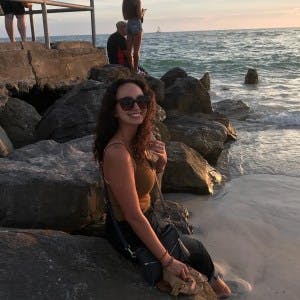Amazing Student: Karrah Bowman
- Hometown: Palm Harbor, Florida
- Degree objective and graduation date: Ph.D. in school psychology, fall 2026
- Degree(s) and graduation date: B.S. in psychology, Florida State University, spring 2019
I chose UGA because of my advisor’s broad research interests in autism disparities. I was (and still am) open to exploring different realms of autism research, and knew I would have the opportunity to do this with Dr. Ashley Harrison. I am also intrigued by the combined clinical and school approach to child psychology, and the potential professional development opportunities available to the program’s graduate students.
Ironically, the Mary Frances Early College of Education school psychology program was the last graduate program I found and applied to, yet I could not have asked for a better program. The universe works in mysterious ways!
What have been some of your favorite classes as a student in the Mary Frances Early College of Education?
Some of my favorite classes over the years have been Developmental Psychopathology and Schooling with Dr. Michele Lease, Quantitative Design in Education with Dr. Kristen Bub, and Cognitive Behavioral Intervention with Dr. Sycarah Fisher. These three classes, exclusively, taught me many valuable skills, and together they have provided me with a comprehensive foundation as I continue to develop as a clinician and researcher in the field of school psychology.
Tell me about your work as a graduate research assistant. What are your duties in that role, and how does it help prepare you for your future career?
My duties have changed as a research assistant throughout my three years. During my first year, I helped my advisor conceptualize the mixed methods design, collect data, and analyze the data for a study evaluating teacher needs for a training about evidence-based inclusive practices for teaching students with autism. I was also able to focus on my thesis, in which I collected survey data from pre-service and in-service teachers. Excitingly, I just defended my thesis, “Pre-service and Active Teachers’ Attitudes Toward Inclusive Education for Autistic Students: Understanding the Mediating Role of Self-efficacy and Autism Knowledge,” last month!
 Last year, I was a project coordinator for a Babies Can’t Wait environmental scan study. I was responsible for quantitative and qualitative data collection, as well as many of the administrative tasks. I am continuing to assist with this project as we work on analyzing the data and disseminating our results through an executive report for the state and manuscripts for peer-reviewed journals.
Last year, I was a project coordinator for a Babies Can’t Wait environmental scan study. I was responsible for quantitative and qualitative data collection, as well as many of the administrative tasks. I am continuing to assist with this project as we work on analyzing the data and disseminating our results through an executive report for the state and manuscripts for peer-reviewed journals.
This year, I am working with my advisor to help publish findings from various projects, including a systematic review examining engagement approaches for mental health services, a mixed methods study investigating young autistic adults’ experiences with stigma, and a study examining the psychometric properties of the Autism Knowledge and Stigma Questionnaire (Harrison et al., 2017) across cultures. All these experiences are preparing me for my future career as a tenure-track professor. I am developing my academic writing skills, gaining breadth and depth of knowledge in areas related to my research interests, and learning how to collaborate with interdisciplinary teams.
You were an instructor in the 2023 Torrance Center Summer Institute. What course(s) did you teach, and how was your experience?
I co-taught a class with my advisor about “Making Your Classroom More Inclusive for Neurodiverse/Autistic Students” for the 2023 Torrance Center Summer Institute. This was a valuable experience in that I could practice my class development and teaching skills. Additionally, this class allowed us to pilot content and instructional components of a training for teachers.
Why are you passionate about school psychology?
I am passionate about school psychology because of the opportunity to directly support children’s social, emotional, behavioral, and academic development. My passion lies in promoting children’s well-being, specifically children on the autism spectrum. Children spend most of their developmental years in school; thus, educational experiences greatly influence their life trajectory. I aspire to continuously identify areas of need and make positive systematic changes to improve children’s educational outcomes.
What are your plans following graduation?
After graduation, I hope to obtain a post-doctoral position where I can work toward earning my licensure in psychology and continue researching areas related to autism and education. Then, I aspire to work at a large state university in the southeast (to stay close to family) and work toward earning a tenured faculty position. I picture myself holding teaching, research, and clinical appointments, similar to my advisor.
Alternatively, I am currently exploring my interest in neuropsychology and working in a hospital setting through the Children’s Healthcare of Atlanta. Perhaps I find a career in academic medicine to be more fitting for my interests. Until then, I will focus on gaining diverse, competitive, and meaningful experiences to help narrow my broad interests into an actionable passion.